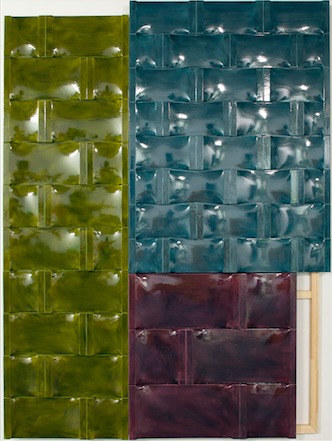Roland Quetsch
May 30 - July 25, 2015
Roland Quetsch
May 30 - July 25, 2015 Fragmented mixtape
Roland Quetsch tests the possibilities and potential limits of painting throughout his work. Unlike pure and absolute abstraction, this research considers the surface and its support in like manner. By manipulating and building his own supports since 2000, Quetsch produces works that resist a purely superficial contemplation and which put to the test both the intelligence of the beholder and his gaze. The principle of fragmentation – of the canvas and sometimes also of the modules of colour – creates a subtle play of surfaces and spaces in pictures poised between painting and sculpture. His paintings often form a series in which each individual work plays a distinct and independent role while being consistent in form and interconnected with the others.
Each work in series 1 is a combination of two surfaces which initially appears to be monochromatic. They consist of ten rows positioned horizontally, each comprising two small paintings measuring 20 x 25 cm and 20 x 50 cm. The technique employed recalls architectural structures and especially brick walls, reflecting the artist’s keen interest in buildings and construction. On some of these panels, the paint is matt. Others have finishes in epoxy resin to create a reflective surface. The strength of these essential works lies primarily in the combination of colours, positioned at different levels and with several layers of paint. The green and blue shimmer through the yellow, pink and red, and through the dark blue-purple. The viewer pauses to reflect and is obliged to focus on the surface of the picture in order to bring out all its subtle nuances.
The physical presence of the works emerges not only for their importance in itself, but also and above all thanks to the relief texture of the canvas. The plays of shadow and light are the result of the support that Roland Quetsch creates. Just as it gives the surface a rhythmic quality, the underlying structure also invites the observer to explore the paint and its effect on the viewer, on the basis of the changing light conditions. Thanks to their finish made using epoxy resin, the horizontal lines formed by the small canvases appear like building blocks or latticed windows. The multiplication of the reflections deliberately directs the gaze towards the underlying and fragmented construction.
This reflecting surface gives an extra and almost unreal dimension to the works. The concave shape of the small canvases assembled in a group enhances the mirror effect in the surfaces in which are reflected the observers and the surrounding space. The reflection varies in strength depending on the colour and light. The mirror and the reflecting surface make it possible to see oneself in a place or space in which it is impossible to exist physically at the same moment. The space of the mirror is a virtual space. At the same time, the reflecting surface offers an extension to one’s gaze, which allows us to contemplate our surroundings from a different perspective.
At the heart of the series 1, therefore, lies not only the principle of fragmentation but also that of multiplication. The inclusion of the viewer and his surroundings involves a social dimension and is the result of Quetsch’s interest in the social structure of the urban environment. The elusive reflections in the panels of bright colours evoke the abstract tradition. Neither depiction nor interpretation, the reflected image is a presence, a spontaneous manifestation on the surface of the canvas which moves constantly at the mercy of the observer’s own movements. The use of epoxy resin and reflective surfaces gives Roland Quetsch the opportunity to test the limits of painting at another level. Just as he builds, customises the canvases and applies painting in several layers, so the mirror-like finish is another means of projecting colour into the work. By acting at many different levels, the paint invites the viewer to dive into it and, like the artist himself, to commit himself to the picture and reflect on his relationship with people and their everyday life.
Artist : Roland Quetsch
Visitor Information
Ceysson & Bénétière
23 rue du Renard
75004 Paris
Tuesday - Saturday
11am - 7pm
T: + 33 1 42 77 08 22









